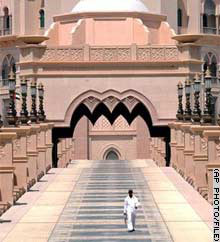 |
 |
 |
 Technology News | April 2005 Technology News | April 2005  
A Traveling Geek's Gilded Dream
 Associated Press Associated Press


| | The hotel opened partially on February 5, but will not be fully up and running until year's end. |
Abu Dhabi, United Arab Emirates - Forget that the $3 billion Emirates Palace hotel, a gargantuan hall of marble slabs and riverine fountains, is probably the most expensive ever built.

Forget also that the 60-acre (24-hectare) interior is an Arabian-motif pleasure palace gilded down to the baseboards and lit by a thousand shimmering chandeliers.

The unique aspects of the Emirates Palace are hidden inside its ductwork: nearly a thousand miles of blue, red and green fiber-optic and broadcast cable, and enough other advancements to have convinced the staff that this is the world's most high-tech hotel. They may even be right.

The government-owned hotel, which has a separate floor reserved for Gulf Arab royalty, boasts an unbroken bubble of wireless Internet access on its 250-acre (100-hectare) grounds. It works next to the two swimming pools, even on the private beach.

Guest rooms are larded with so many techie amenities that the seven remote controls required to operate them have been distilled into a portable touch-screen panel.

Hotel employees whisk themselves on two-wheeled Segway scooters to the physical plant, more than a half-mile away, where the hotel's massive air conditioners, emergency generators and underground reservoir of fresh water for the gardens are kept, leaving the hotel basking in silence.

The Emirates Palace looms over the beachfront of oil-rich Abu Dhabi, capital of the United Arab Emirates.

Soaring oil revenues and the real estate boom in this Middle Eastern sheikdom have fueled pell-mell economic growth. Arab investors no longer plow their earnings into the United States- viewed as increasingly anti-Arab after Sept. 11, 2001 - so the proceeds are bankrolling ever more audacious local projects.

The Emirates Palace is the latest example. In neighboring Dubai, where the boom is even more dramatic, there is the sail-shaped Burj al-Arab hotel and enormous manmade islands shaped like palm trees.

The unrestrained luxury of the Emirates Palace is perhaps its chief draw, luring a stream of Gulf royalty and illustrious guests including German Chancellor Gerhard Schroeder.

"We've had a few kings and queens and princesses," said IT director Martin Coeshott.

More importantly, says Coeshott, Schroeder's trade-related address in the hotel's sumptuous theater last month was simultaneously broadcast to every room in the palace and streamed worldwide over the Internet.

The hotel opened partially on February 5, but will not be fully up and running until year's end.

The German Kempinski chain, which manages the Emirates Palace, aims to use its technological infrastructure to attract government conferences, especially those needing tight network security.

That ability was a top draw for February's international arms trade show, where defense officials from several countries wanted secrecy and secure telephones for weapons deals, Coeshott said.

The hotel's network already has a full-time security officer who monitors its 16 firewalls and intrusion detection systems. The staff is working to win accreditation used by the British banking system, Coeshott said.

On special request, the computer and broadcast network - and its 3.5 terabyte storage network - can be cut off completely from the outside world, like the U.S. government's secure intranet, he said.

Guests in the hotel's 394 bedrooms, where nightly rates range from $600 to $12,000, get a handheld computer to interact with the television, stereo and 30 separate lights in each room. The $2,500 Linux-based AMX handheld, with an 8-inch color screen, can also arrange a wake-up call, download a movie, record a TV show or call for maid service.

"You can lie in bed and adjust everything," said Rumyanka Tzolova, Kempinski's marketing manager. "You don't have to move. You don't have to pick up the phone."

The hotel's 17-person technology department designed the interface, which is complex enough to require a butler to tutor guests in its use.

There are plenty of kinks to be worked out. This reporter was able to send an e-mail from his Web-based e-mail account but only after frustrated fiddling with the clunky interface. Once the room's lights were turned off, it was difficult to turn them back on.

"We're still working on it," Coeshott said.

Hotel workers use similar tablets to control television programming, lighting, sound and cooling in the hotel.

The hotel is so huge that Coeshott's team is trying to spare guests the half-mile walk to the main swimming pool by setting up Web cameras there and in two dozen other hotspots, so guests - or Internet voyeurs - can monitor the crowds.

Water is another issue. The hotel uses 200,000 gallons per day to water the 150 acres (60 hectares) of lush palm walks, emerald lawns and delicate gardens that would otherwise be scorched by the Arabian sun.

The hotel installed cisterns holding six million gallons, enough for 30 days of watering, in case of a breakdown at the local desalinization plant.

Too much technology can be a bad thing. | 
 | |
 |



